Introduction
Parrots are curious eaters, and you might wonder, can parrots eat cashews? As a bird owner, it’s crucial to know which foods are safe and healthy for your feathered friend. Cashews, a favorite snack for humans, may seem like a tempting treat for parrots, but are they a good choice?
In this article, we’ll answer whether parrots can eat cashews, discuss their benefits and risks, and share tips for feeding them safely. Keep reading to make the best choices for your parrot’s health and happiness!
Are Cashews Safe for Parrots?
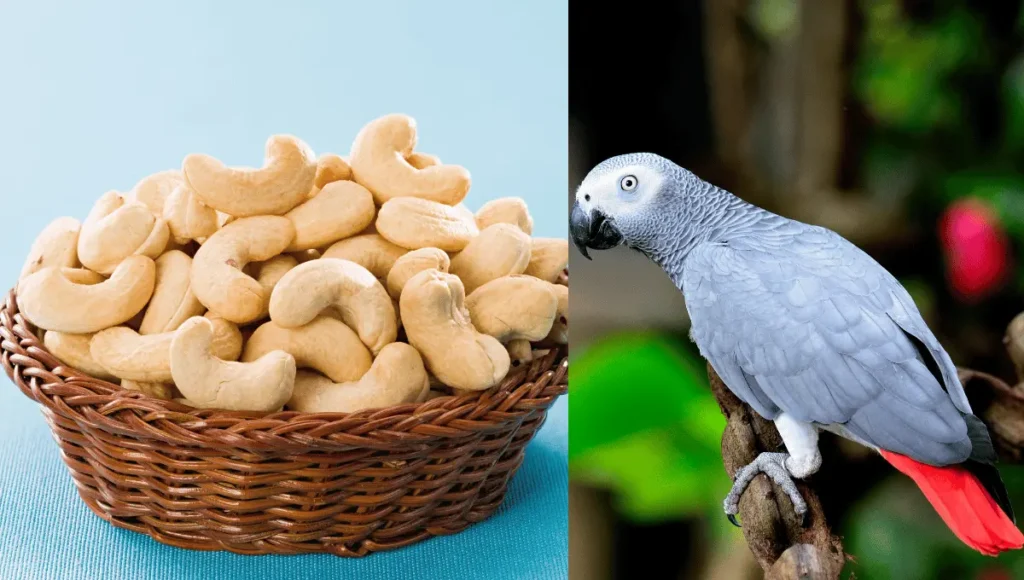
When it comes to offering cashews to parrots, the short answer is yes, but with caution. While cashews can provide nutritional benefits, there are also risks to consider. Let’s explore both sides to help you decide if cashews are right for your bird.
Nutritional Benefits of Cashews
Cashews are packed with nutrients that can benefit parrots when given in moderation:
Healthy Fats:
Cashews contain unsaturated fats that provide energy and support feather health.
Vitamins and Minerals:
They are a good source of magnesium, copper, and vitamin K, all of which contribute to a parrot’s overall well-being.
Protein:
Cashews offer a small protein boost, which is essential for maintaining muscle and tissue health in parrots.
These nutrients can make cashews a valuable occasional treat for parrots, especially during times when they need an extra energy boost, such as molting.
Potential Risks of Feeding Cashews to Parrots
Despite their benefits, cashews also come with risks that should not be overlooked:
High-Fat Content:
Cashews are calorie-dense and can lead to weight gain or obesity if overfed. Parrots have small bodies and don’t need much fat in their diet.
Allergic Reactions:
Like many nuts, cashews may cause allergic reactions in some birds. Symptoms can include vomiting, difficulty breathing, or unusual behavior.
Salt and Additives:
Store-bought cashews are often salted, roasted, or coated with flavorings, which can be harmful to parrots. Always choose plain, raw, or unsalted cashews.
Parrots Eat Cashews
| Aspect | Details |
| Can parrots eat cashews? | Yes, but only in moderation, and they must be plain, unsalted, unseasoned, and either raw or lightly roasted. |
| Health Benefits | – High in healthy fats.- Good source of protein and vitamins (e.g., vitamin K, magnesium). |
| Potential Risks | – High fat content can lead to obesity if overfed.- Salted or seasoned cashews can harm parrots. |
| Serving Size | A few small pieces, 1–2 times per week, depending on the parrot’s size. |
| Preparation Tips | – Always use unsalted and unseasoned cashews.- Break into small, manageable pieces. |
| Alternatives | Almonds, walnuts, or unsalted peanuts, but always in moderation. |
| Important Notes | – Ensure cashews are fresh and free from mold.- Avoid cashews as a staple food; parrots need a balanced diet. |
How to Safely Feed Cashews to Parrots
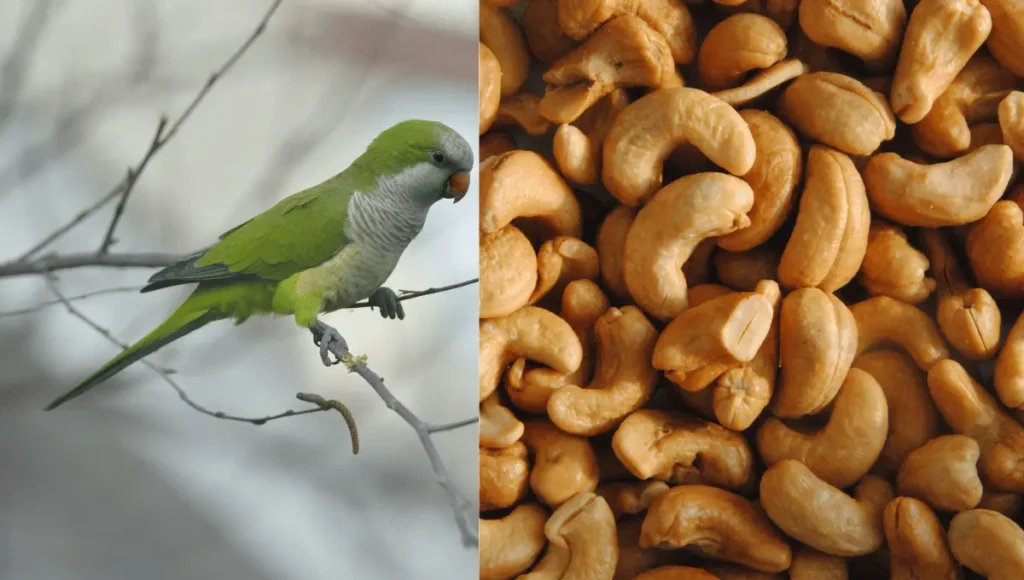
If you’ve decided to share cashews with your parrot, it’s important to prepare and serve them correctly. Here’s how to ensure cashews become a safe and enjoyable treat for your bird.
Choosing the Right Cashews
Not all cashews are suitable for parrots. Here’s what to look for:
Plain and Raw:
Opt for raw, unsalted cashews. Flavored or salted cashews can contain harmful ingredients like salt, sugar, or spices.
Unprocessed:
Avoid roasted or coated cashews, as these can include oils and additives that aren’t safe for parrots.
Freshness Matters:
Make sure the cashews are fresh. Stale or moldy nuts can make your parrot sick.
Serving Size and Frequency
Cashews are a treat, not a staple food. To keep your parrot healthy:
Moderation is Key:
Limit cashews to 1–2 small pieces, no more than once or twice a week. Parrots need a balanced diet, and too many cashews can upset that balance.
Treat, Not a Meal:
Cashews should be offered as a reward or occasional snack, not a regular part of their daily diet.
Preparing Cashews for Your Parrot
Proper preparation ensures cashews are safe and easy for your parrot to eat:
Chop or Crush:
Large cashews can be difficult for parrots to handle. Cut them into small chunks or gently crush them to make them easier to eat.
Serve Alone or Mixed:
You can offer cashews alone or mix them with other bird-safe foods like fruits or seeds for variety.
Avoid Overfeeding:
If you’re including cashews as part of a mix, adjust the portion sizes of other treats accordingly.
Alternatives to Cashews for Parrots
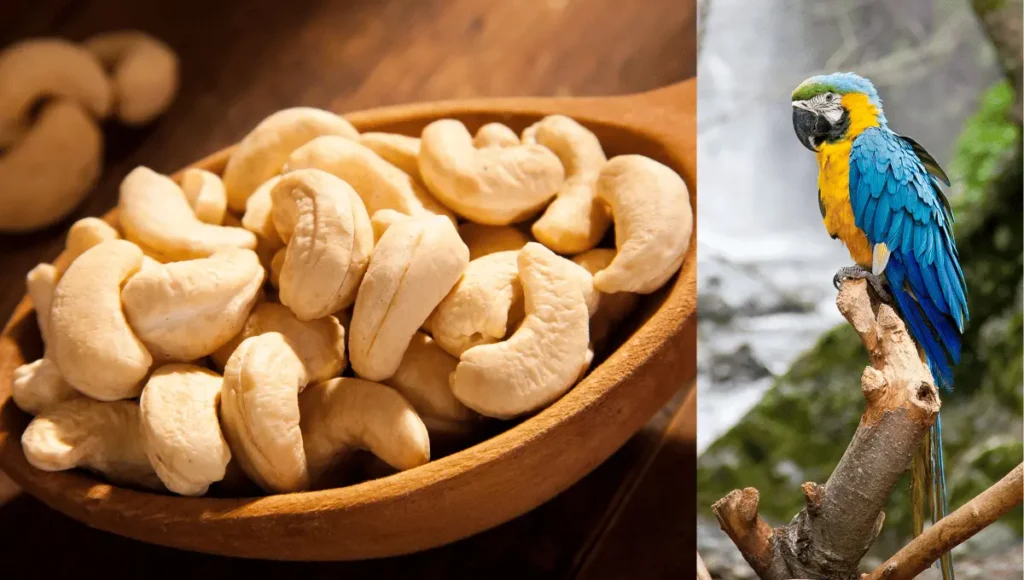
While cashews can be a safe treat in moderation, it’s always good to have a variety of healthy options for your parrot. Offering alternatives ensures your bird enjoys a balanced diet while still experiencing new tastes and textures.
Other Nut Options for Parrots
Nuts are a favorite for many parrots, but not all nuts are safe. Here are some great alternatives to cashews:
Almonds:
A healthy choice that’s rich in calcium, supporting bone health. Make sure they’re unsalted and raw.
Walnuts:
Walnuts are rich in omega-3 fatty acids, which are great for supporting brain function. Be sure to chop them into small pieces for easier consumption.
Pistachios:
These can be a fun and nutritious treat. Always remove the shells, and opt for unsalted versions.
Hazelnuts:
Another safe nut provides a good source of healthy fats and vitamin E.
Note:
Always feed nuts in moderation. Parrots don’t need many to reap the benefits.
Non-Nut Treats for a Balanced Diet
If you’re looking for alternatives that aren’t nuts, there are plenty of bird-safe fruits and vegetables to consider:
Fruits
Apples:
A crunchy favorite. Remove the seeds, as they contain toxins.
Berries:
Blueberries, strawberries, and raspberries are antioxidant-rich and easy for parrots to eat.
Bananas:
Soft and naturally sweet, bananas are a perfect occasional treat.
Vegetable Carrots:
Crunchy and full of vitamin A, carrots are a healthy and fun snack.
Peas:
These small, nutrient-packed vegetables are easy for parrots to pick up and eat.
Leafy Greens:
Spinach, kale, or romaine lettuce provides essential nutrients and hydration.
Why Variety Matters
Offering a wide range of foods keeps your parrot excited about mealtime and ensures they get all the nutrients they need. Rotating treats like nuts, fruits, and vegetables helps prevent boredom and keeps your bird healthy.
Signs of Trouble: What to Watch For
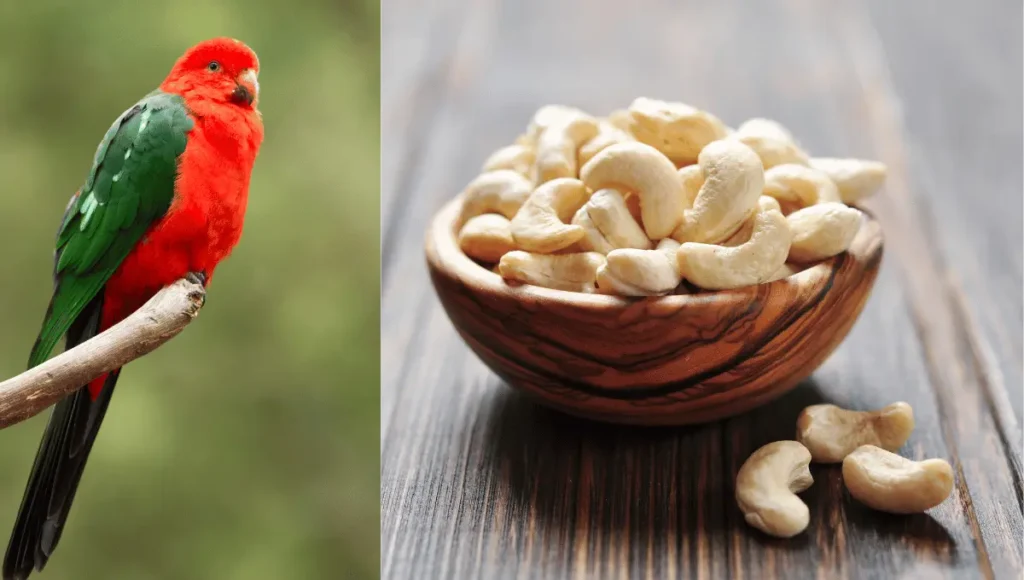
When introducing new foods like cashews to your parrot, it’s important to monitor their reaction. While cashews can be safe, some parrots may experience adverse effects if they overeat or have a sensitivity. Here’s what to look out for and how to respond.
Recognizing Allergic Reactions
Parrots, like humans, can develop allergies or sensitivities to certain foods. Watch for these common signs of an allergic reaction:
Vomiting or Regurgitation:
If your parrot throws up soon after eating, it could be a reaction to the cashew.
Lethargy:
Unusual tiredness or lack of energy can indicate something is wrong.
Swelling or Difficulty Breathing:
These severe symptoms may signal an allergic reaction and require immediate attention.
Changes in Droppings:
Watery or discolored droppings could indicate digestive upset.
If you notice any of these signs, stop feeding cashews immediately and consult your avian veterinarian.
What to Do if Your Parrot Overeats Cashews
Even safe foods can cause problems if overfed. Cashews are high in fat, and eating too many can lead to:
Digestive Issues:
Diarrhea or discomfort due to the rich, fatty content of cashews.
Weight Gain:
Over time, too many high-calorie treats can lead to obesity, impacting your parrot’s overall health.
Steps to Take:
Limit Food Access:
Remove excess cashews or other high-fat treats from their cage.
Monitor Behavior:
Keep a close eye on your parrot for any unusual signs like reduced activity or a lack of appetite.
Adjust Their Diet:
Balance out their meals with lighter, low-fat foods like fruits and vegetables.
Consult a Veterinarian:
If your parrot shows persistent symptoms or appears unwell, seek professional advice promptly.
Prevention is Key
To avoid these issues:
- Always stick to recommended portion sizes (1–2 small cashew pieces per week).
- Introduce new foods slowly to see how your parrot reacts.
- Maintain a varied and balanced diet to prevent reliance on any single type of food.
Conclusion
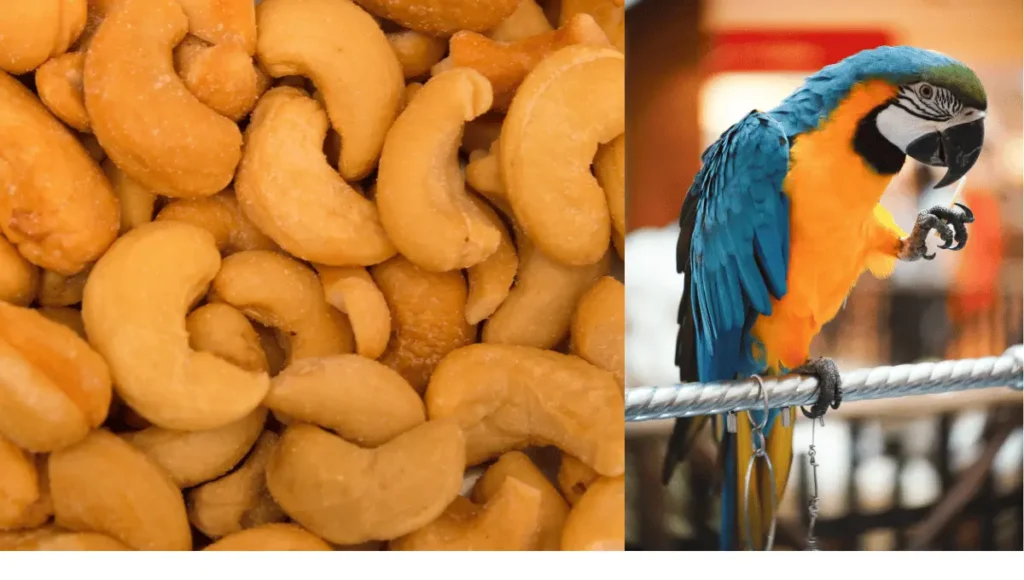
In conclusion, can parrots eat cashews? Yes, but with care. Cashews can be a healthy, occasional treat for your parrot when served in moderation. They offer nutritional benefits like healthy fats, vitamins, and minerals, but they also come with potential risks, especially if overfed or improperly prepared.
By choosing unsalted, raw cashews, controlling portion sizes, and serving them alongside other bird-safe foods, you can safely include them in your parrot’s diet. Remember to always monitor your bird’s reaction and be aware of any signs of digestive issues or allergies.
It’s important to provide your parrot with a variety of foods to ensure they receive all the nutrients they need for a happy and healthy life. Cashews are just one part of the puzzle—mixing them with fruits, vegetables, and other nuts can offer your parrot a well-rounded, enjoyable diet.
Always prioritize your parrot’s health and well-being, and when in doubt, consult a veterinarian for personalized advice. With the right care, your parrot can enjoy a wide range of treats while staying safe and healthy!
FAQs
Can parrots eat cashews every day?
No, parrots should not eat cashews every day. Cashews are high in fat and should be given as an occasional treat, no more than 1–2 small pieces per week.
Are salted cashews safe for parrots?
No, salted cashews are not safe for parrots. The salt and added flavors can harm their health. Always choose raw, unsalted cashews.
How do I know if my parrot is allergic to cashews?
Watch for symptoms like vomiting, lethargy, difficulty breathing, or changes in droppings after eating cashews. If you notice any of these signs, stop feeding cashews and consult your veterinarian.
What are some other nuts that parrots can eat?
Parrots can safely eat unsalted almonds, walnuts, pistachios, and hazelnuts in moderation. Always ensure they are plain and raw.
What should I do if my parrot eats too many cashews?
Remove any remaining cashews, monitor your parrot for signs of digestive upset, and adjust their diet with lighter foods like fruits or vegetables. If symptoms persist, contact a veterinarian.
Pingback: Can Parrots Eat Honey? Safe Treat or Hidden Danger?